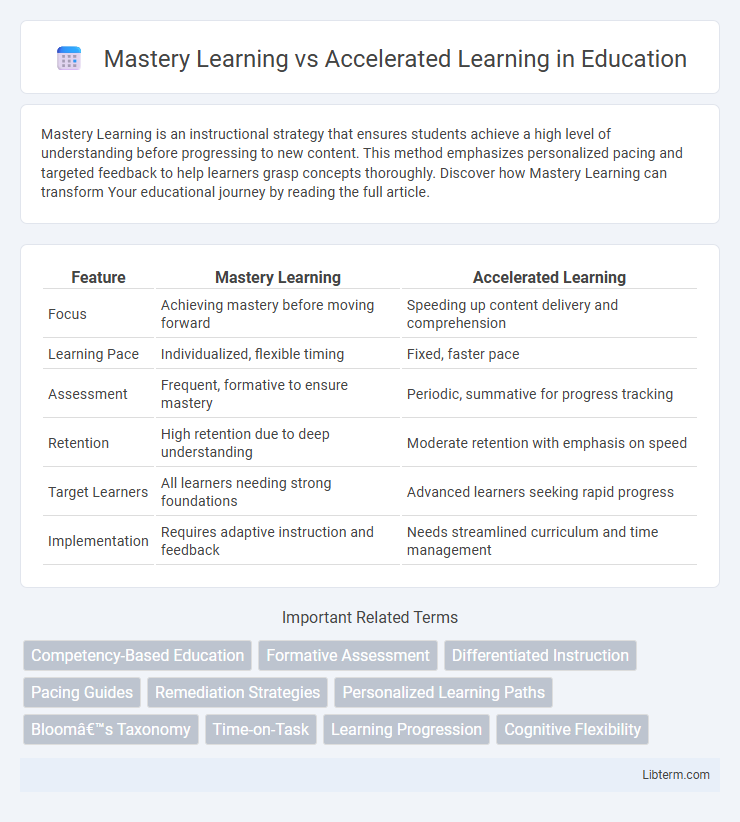Mastery Learning is an instructional strategy that ensures students achieve a high level of understanding before progressing to new content. This method emphasizes personalized pacing and targeted feedback to help learners grasp concepts thoroughly. Discover how Mastery Learning can transform Your educational journey by reading the full article.
Table of Comparison
| Feature | Mastery Learning | Accelerated Learning |
|---|---|---|
| Focus | Achieving mastery before moving forward | Speeding up content delivery and comprehension |
| Learning Pace | Individualized, flexible timing | Fixed, faster pace |
| Assessment | Frequent, formative to ensure mastery | Periodic, summative for progress tracking |
| Retention | High retention due to deep understanding | Moderate retention with emphasis on speed |
| Target Learners | All learners needing strong foundations | Advanced learners seeking rapid progress |
| Implementation | Requires adaptive instruction and feedback | Needs streamlined curriculum and time management |
Introduction to Mastery Learning and Accelerated Learning
Mastery Learning emphasizes achieving a high level of understanding in a topic before progressing, ensuring students fully grasp concepts through personalized pacing and frequent assessments. Accelerated Learning aims to speed up the acquisition of knowledge by using techniques such as multi-sensory engagement, spaced repetition, and active participation to enhance cognitive processing and retention. Both approaches optimize learning efficiency but differ in focus: Mastery Learning centers on depth and comprehension, while Accelerated Learning prioritizes rapid skill and knowledge acquisition.
Defining Mastery Learning
Mastery Learning is an educational approach where students achieve a deep understanding of a subject before moving on to the next topic, ensuring complete comprehension and skill acquisition. It involves formative assessments and targeted feedback tailored to individual learning paces, prioritizing quality of learning over speed. This method contrasts with Accelerated Learning, which emphasizes faster content delivery and rapid progression through material.
Defining Accelerated Learning
Accelerated Learning is an educational approach designed to increase the speed at which learners acquire knowledge and skills by using interactive techniques, multimedia tools, and cognitive strategies that enhance retention and understanding. It contrasts with Mastery Learning, which emphasizes achieving a high level of proficiency before progressing, by focusing on reducing the time to competency without compromising comprehension. Key elements of Accelerated Learning include active engagement, multisensory input, and customized pacing tailored to individual learner needs.
Core Principles of Mastery Learning
Mastery Learning emphasizes achieving a high level of understanding in one topic before progressing to the next, relying on formative assessments and individualized feedback to ensure students reach proficiency. Core principles include clear learning objectives, frequent assessments, and corrective instruction tailored to address specific learning gaps. This approach contrasts with Accelerated Learning, which prioritizes rapid content coverage and compressed timelines, often sacrificing depth for speed.
Core Principles of Accelerated Learning
Accelerated Learning centers on engaging multiple senses and integrating emotional, cognitive, and social elements to enhance the speed and retention of knowledge acquisition. Techniques include active participation, relaxation methods, and the use of visuals and music to create an immersive learning environment. Unlike Mastery Learning, which emphasizes sequential mastery of content before progression, Accelerated Learning prioritizes rapid comprehension through holistic and interactive experiences.
Benefits of Mastery Learning
Mastery Learning ensures students achieve a high level of understanding before progressing, leading to improved retention and deeper comprehension. This approach minimizes gaps in knowledge, reducing the risk of future learning difficulties and boosting academic confidence. Studies show that Mastery Learning enhances long-term performance by emphasizing personalized pacing and targeted feedback.
Benefits of Accelerated Learning
Accelerated Learning enhances information retention and application by utilizing techniques such as spaced repetition and active recall, which optimize cognitive processing speed. This approach allows learners to master complex subjects in a shorter time frame, improving efficiency and motivation. The emphasis on immersive, interactive experiences fosters deeper engagement and helps develop critical thinking skills faster than traditional Mastery Learning methods.
Challenges and Limitations of Each Approach
Mastery Learning faces challenges such as requiring significant time investment and individualized pacing, which can strain teaching resources and slow overall curriculum progression. Accelerated Learning risks superficial understanding due to its rapid pace, potentially leading to increased cognitive overload and reduced retention in complex subjects. Both approaches must balance depth of comprehension with time efficiency to optimize educational outcomes effectively.
Comparing Effectiveness in Different Educational Settings
Mastery Learning ensures students achieve a high level of understanding before progressing, which improves retention and competence in traditional classroom settings. Accelerated Learning speeds up the educational process through techniques like multimedia and active engagement, proving effective in corporate training and adult education environments. Studies show Mastery Learning excels in foundational subjects requiring depth, while Accelerated Learning benefits learners needing rapid skill acquisition and practical application.
Choosing the Right Strategy for Diverse Learners
Mastery Learning emphasizes ensuring students achieve a deep understanding of content before progressing, benefiting learners who need a solid foundation and personalized pacing. Accelerated Learning targets rapid skill acquisition and keeps advanced learners challenged by compressing learning timelines without sacrificing comprehension. Selecting the right strategy depends on assessing learners' prior knowledge, motivation, and cognitive abilities to tailor instruction that maximizes engagement and mastery outcomes.
Mastery Learning Infographic

 libterm.com
libterm.com